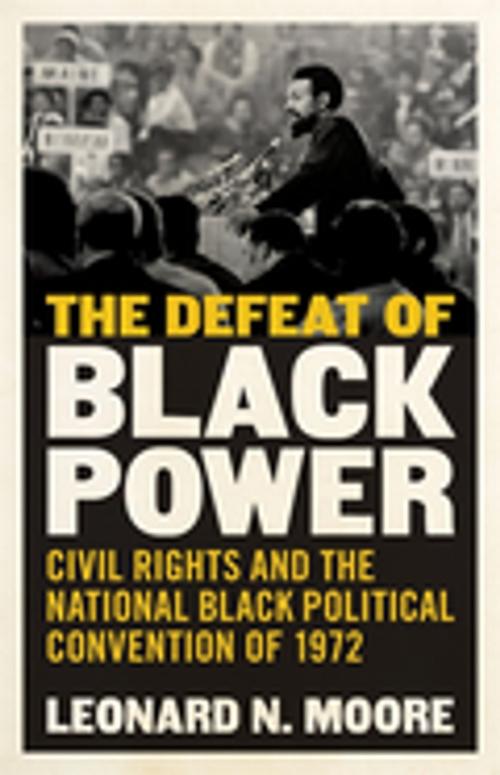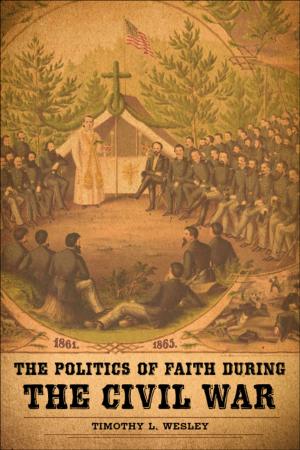The Defeat of Black Power
Civil Rights and the National Black Political Convention of 1972
Nonfiction, Social & Cultural Studies, Social Science, Cultural Studies, African-American Studies| Author: | Leonard N. Moore | ISBN: | 9780807169056 |
| Publisher: | LSU Press | Publication: | February 15, 2018 |
| Imprint: | LSU Press | Language: | English |
| Author: | Leonard N. Moore |
| ISBN: | 9780807169056 |
| Publisher: | LSU Press |
| Publication: | February 15, 2018 |
| Imprint: | LSU Press |
| Language: | English |
For three days in 1972 in Gary, Indiana, eight thousand American civil rights activists and Black Power leaders gathered at the National Black Political Convention, hoping to end a years-long feud that divided black America into two distinct camps: integrationists and separatists. While some form of this rift existed within black politics long before the 1968 assassination of Dr. Martin Luther King, Jr., his death—and the power vacuum it created—heightened tensions between the two groups, and convention leaders sought to merge these competing ideologies into a national, unified call to action. What followed, however, effectively crippled the Black Power movement and fundamentally altered the political strategy of civil rights proponents. An intense and revealing history, Leonard N. Moore’s The Defeat of Black Power provides the first in-depth evaluation of this critical moment in American history.
During the brief but highly charged meeting in March 1972, attendees confronted central questions surrounding black people’s involvement in the established political system: reject or accept integration and assimilation; determine the importance or futility of working within the broader white system; and assess the perceived benefits of running for public office. These issues illuminated key differences between integrationists and separatists, yet both sides understood the need to mobilize under a unified platform of black self-determination. At the end of the convention, determined to reach a consensus, officials produced “The National Black Political Agenda,” which addressed the black constituency’s priorities. While attendees and delegates agreed with nearly every provision, integrationists maintained their rejection of certain planks, namely the call for a U.S. constitutional convention and separatists’ demands for reparations. As a result, black activists and legislators withdrew their support less than ten weeks after the convention, dashing the promise of the 1972 assembly and undermining the prerogatives of black nationalists.
In The Defeat of Black Power, Moore shows how the convention signaled a turning point for the Black Power movement, whose leaders did not hold elective office and were now effectively barred access to the levers of social and political power. Thereafter, their influence within black communities rapidly declined, leaving civil rights activists and elected officials holding the mantle of black political leadership in 1972 and beyond.
For three days in 1972 in Gary, Indiana, eight thousand American civil rights activists and Black Power leaders gathered at the National Black Political Convention, hoping to end a years-long feud that divided black America into two distinct camps: integrationists and separatists. While some form of this rift existed within black politics long before the 1968 assassination of Dr. Martin Luther King, Jr., his death—and the power vacuum it created—heightened tensions between the two groups, and convention leaders sought to merge these competing ideologies into a national, unified call to action. What followed, however, effectively crippled the Black Power movement and fundamentally altered the political strategy of civil rights proponents. An intense and revealing history, Leonard N. Moore’s The Defeat of Black Power provides the first in-depth evaluation of this critical moment in American history.
During the brief but highly charged meeting in March 1972, attendees confronted central questions surrounding black people’s involvement in the established political system: reject or accept integration and assimilation; determine the importance or futility of working within the broader white system; and assess the perceived benefits of running for public office. These issues illuminated key differences between integrationists and separatists, yet both sides understood the need to mobilize under a unified platform of black self-determination. At the end of the convention, determined to reach a consensus, officials produced “The National Black Political Agenda,” which addressed the black constituency’s priorities. While attendees and delegates agreed with nearly every provision, integrationists maintained their rejection of certain planks, namely the call for a U.S. constitutional convention and separatists’ demands for reparations. As a result, black activists and legislators withdrew their support less than ten weeks after the convention, dashing the promise of the 1972 assembly and undermining the prerogatives of black nationalists.
In The Defeat of Black Power, Moore shows how the convention signaled a turning point for the Black Power movement, whose leaders did not hold elective office and were now effectively barred access to the levers of social and political power. Thereafter, their influence within black communities rapidly declined, leaving civil rights activists and elected officials holding the mantle of black political leadership in 1972 and beyond.















